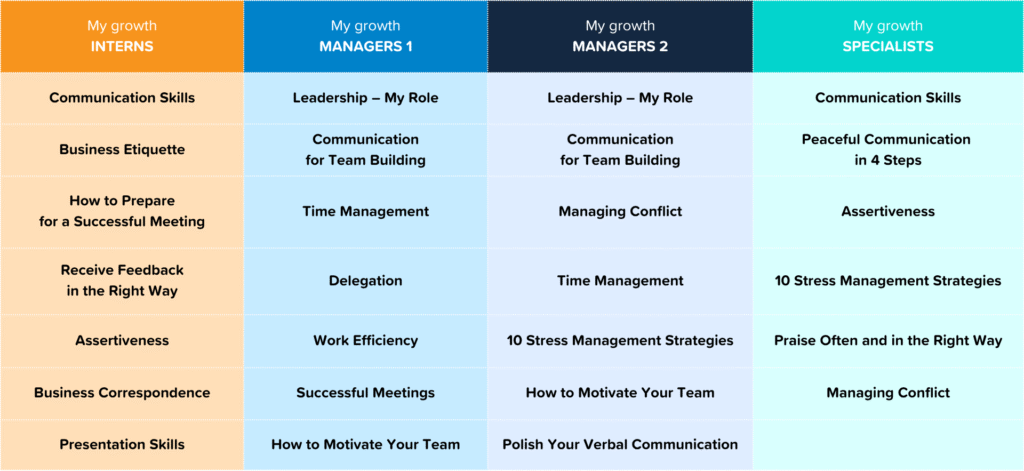
Like any major organization, the one in our example understands that success stems from quality interpersonal relationships and the people who communicate daily with clients, customers, and each other. For everything to run smoothly, it’s essential to equip them with the right skills and tools. This company is highly aware of that, and even though their market success was already impressive, they decided that there’s always room for improvement – and for making everyday work easier. In this case study you can read how an international retail chain chose to strengthen its teams by improving clarity of communication, cooperation, and overall efficiency.
Challenges
The broader context: an international retail chain in the food industry, with several hundred stores across a dozen countries. Like any large company, it operates on established processes and routines – but what if they can do better? A large number of employees brings inevitable challenge – dislocation across the country, international markets, numerous teams that need to cooperate on a daily basis – misunderstandings happen. When you add a large number of foreign workers that this company employs, communication barriers grow even further. These employees not only interact with each other but also with countless customers every day. Miscommunication and unclear messages can easily lead to difficulties in teamwork and daily operations.
Desired Outcomes
This company takes pride in investing in its employees through various development initiatives and projects. In line with that, they decided to provide their employees with all the tools necessary to minimize misunderstandings – whether they’re caused by language barriers, limited communication skills, emotional unawareness, high stress levels, or lack of empathy and understanding – for themselves and their colleagues. The company’s goal was to reduce these factors in order to empower their employees for daily work, strengthen communication within and between teams, build resilience to daily challenges, improve customer service by developing employee interpersonal skills, and finally, strengthen the overall culture of understanding, learning and continuous growth.
Solution
To achieve these goals, this company implemented a two-part solution: the LPC for Business service, and Croatian language eLearning courses for store workers within the LPC platform.
The LPC LMS and LPC for Business provided access to over 100 eLearning courses covering professional and personal development topics – from leadership to communication and foreign languages – with the added possibility of custom content creation and 24/7 access to all learning materials.
At the same time, the Croatian language course helped non-native employees quickly and interactively master everyday vocabulary and get to know the local culture.
Implementation
Preparations for implementing these solutions began several months before employees actually started using the LPC platform.
LPC for Business
1. Training Needs Analysis
In order to create a learning plan according to specific participant needs, roles and the challenges they face, while following company goals and values, our LPC Consultants and the Client (especially the HR department) met several times, and together they created an annual learning plan customized for four different participant groups.
2. Pre-Kick Off Activities
The Client and HalPet agreed on the frequency of reminders, progress tracking, and reporting to key Client stakeholders.
Since HalPet’s approach emphasizes clear communication in all directions – a value this Client also shares – participants received timely notifications and detailed instructions on what to expect.
Each group had a 30-minute virtual Kick Off Meeting, where LPC Consultants demonstrated how to use the platform, where to find the courses, how to get support if needed, and how to approach learning “the LPC way.” It is also important to mention that these Kick Off Meetings and all key information were also converted into eLearning content and uploaded to the LPC system, so participants could revisit them anytime.
The key Client stakeholders received the same information, as well as additional manuals for group management and progress tracking.
3. Setting Up “My Growth”
Four groups were created in the LPC system according to the Client’s needs. Each group received 6 to 7 courses, carefully selected from the rich LPC for Business library, to support their specific goals. This way, 150 participants received a personalized Learning Journey for the next 12 months.
The LPC for Business solution provided each Learner with mandatory programs from January to December 2025, with clearly defined timelines for each, i.e., each participant was provided with their personal “My Growth”. In addition, they received access to over 100 optional courses covering topics such as leadership, communication, resilience, stress management, microlearning, et cetera.
My growth – 4 groups

The implementation of the eLearning course Basic Croatian for Store Workers followed a similar process. All the same key steps were included – meetings with the Client, selecting the most suitable first-level Croatian language courses for foreign workers, defining timelines, and setting up progress-tracking methods.
The course consists of three lessons and a final knowledge test, with a few months allocated for completion. HalPet tracked participants’ progress, sending weekly reminders. The timeline was made according to the date of their arrival to Croatia – i.e., these 135 participants gained access to the LPC platform and the Croatian language course several months before arriving to Croatia.
To ensure a smooth onboarding experience, the program was announced in advance, and participants received detailed instructions for registration and using the LPC platform, both before and at the start of the program.
After completing the course, they could continue improving their knowledge through three mini follow-up courses – Power Up exercises 1, 2, and 3.
As with the LPC for Business solution, the Client stakeholders received monthly progress reports, while having the option to independently track any participant’s progress, shown also graphically, and download reports in Excel format.
Because the company has strong experience in employee training and development, they also appreciated the ability to integrate LPC reports with their HR tools, making it easier to measure learning outcomes and internally report results.
4. Additional Activities
LPC for Business participants also have an option of joining in to monthly webinars on relevant business and personal topics, such as leadership, work-life balance, managing change, using AI tools, and many more.
Results
Judging by the current results, the implementation of the LPC platform went flawlessly and employees have fully embraced this way of learning. They see it not only as an opportunity to improve their professional skills but also as a way to grow personally.
Since the project is only halfway through, we’ll share two progress checkpoints from the journey so far – after two months and after six months. Maybe you’re wondering why precisely these two? Well, six months makes sense – the project’s midpoint. But we also chose the two-month mark to show the consistency of these participants’ success. As we mentioned earlier, the project’s beginning was marked by enthusiasm, which was clearly seen from the number of initial logins and how quickly the learning began. Two months in, participants had settled into the process and completed one or two programs from their personal development plans – a good time to test whether motivation was just an initial spark or something lasting.
*Move the slider to fins out more.*
Checkpoint 1 – After Two Months
In just two months of using LPC for Business, 150 participants completed nearly 600 courses, and half of those were additional courses, i.e., beyond the ones required in their learning plans.
Similarly, in those first two months, 123 participants (91%) successfully completed the course Basic Croatian for Store Workers, and 14 of them had already started upgrading their knowlegde with the first Power Up course.
Checkpoint 2 – After Six Months
After six months – halfway through the project – LPC for Business participants’ number of completed courses grew to nearly 1,000. When focusing only on the mandatory courses, the completion rate remained consistently above 80% within the expected timeframe.
The Croatian language learners also achieved excellent results – with an average score of 85%, 97% (131 out of 135) of them successfully completed the course. Their effort and consistency are unquestionable when we look at the fact that they went through the course multiple times and continuously achieved higher scores on the final knowledge tests, as well as completing the Power Up exercises. The biggest effect, though, was visible when the participants arrived to Croatia, with one story particularly standing out. On arrival to their first workday, they proudly and confidently greeted their Croatian colleagues with a friendly “Dobar dan”, and continued the conversation using as many Croatian words as they could remember from the course.
This small but meaningful anecdote perfectly illustrates the course’s real-life impact – it shows that employees felt confident enough to use their new language skills from day one, creating a positive first impression, for themselves and their local colleagues. Secondly, the ability to access the course on their phone makes it easy to review materials anytime and anywhere, while the minimal number of support requests from participants demonstrated how intuitive and easy-to-use the LPC platform is.
Through this way of learning, participants in LPC for Business have:
- developed a habit of continuous learning
- become more proactive in solving daily challenges
- improved the clarity of their communication – verbal, nonverbal, and written
- gained confidence in public speaking, whether in team meetings, among colleagues, or with customers
- strengthened relationships with both colleagues and customers
- enhanced the customer experience
- found tools to reduce stress and miscommunication in their everyday work.
Participants in the LPC Basic Croatian for Store Workers course have:
- successfully mastered the basics of the Croatian language
- learned the names of food and beverages
- gained vocabulary to navigate store interactions
- improved customer experience through communication in Croatian
- built confidence to actively use the language.
The results clearly show that enthusiasm remains high – this program has helped establish a lasting culture of continuous learning and development. It has also successfully provided the essential language foundation for a confident start in Croatia.
Conclusion
Although this project is still ongoing, we can confidently say this company is well on its way to achieving all of its goals. By giving employees this opportunity, they have equipped them with practical tools for strengthening their communication and interpersonal skills, managing everyday challenges more effectively, taking better care of their mental well-being, and improving their work-life balance. Team communication has noticeably improved – participants are actively applying what they’ve learned, showing more understanding and empathy toward each other, delegating tasks with more ease, but also taking responsibility – resulting in fewer misunderstandings and clearer, more open feedback exchanges.
The second part of the solution – the Croatian language course – also played an important role. It gave employees the basic vocabulary they needed to communicate easier with colleagues and understand local customs and culture. After all, language and culture go hand in hand. 😊
Beyond improving internal collaboration, in just a few months the program also raised the overall level of customer service provided, as employees started applying their new communication and interpersonal skills in daily interactions.
Another key achievement – and perhaps the foundation for all the others – is the development of a habit of continuous learning and personal growth. The participants have shown genuine commitment to building a culture of ongoing development and self-improvement.
Of course, collaboration, communication, and transparency only truly work when led by example – and in this case, this company did just that. From the very first announcements, to progress tracking and giving recognition, they demonstrated leadership through action at every step of the learning process.
Next Steps
After the summer break, participants will continue their learning journey with several more months of continuous development, while HalPet and the Client will continue to track their progress and collaborate on future learning plans.